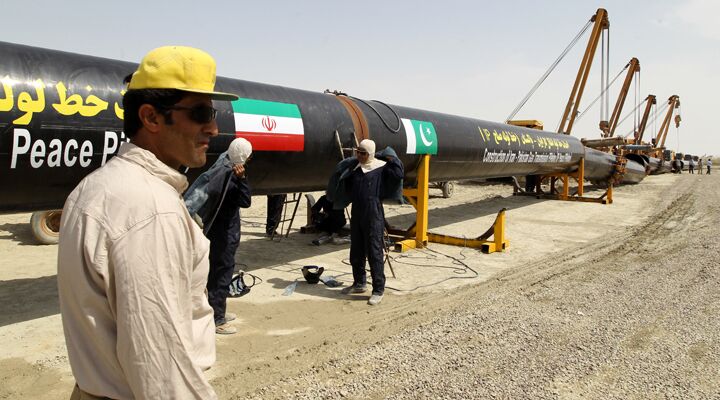
A Middle East ‘Peace Pipe’
Iranian and Pakistani officials met on March 11 for the groundbreaking ceremony of a controversial gas pipeline that defies U.S. sanctions. The meeting was broadcast live in Iran as Iranian President Mahmoud Ahmadinejad and Pakistani President Asif Ali Zardari shook hands and prayed together following the announcement of the deal.
The gas line, dubbed the “peace pipeline,” when completed will run 1,140 kilometers from Assaluyeh in southern Iran, to Nawabshah in Pakistan. lran claims it has finished its section already. President Zardari will oversee the construction of 78 kilometers of pipeline on Pakistani soil.
If the construction goes as planned, the pipes will be finished in late 2014. At that point, 750 million cubic feet of natural gas per day will start pouring into Pakistan from Iran. Such vast quantities of gas means plenty of cash for Iran.
This is what upsets the United States. By trading directly with Iran, the U.S. claims Pakistan is defying sanctions on Iran.
Iran has the second-largest natural gas reserve in the world, yet it doesn’t have the means to sell it. International sanctions limit sales of crude oil and gas. For President Ahmadinejad this is a welcome lifeline to sidestep the crippling sanctions.
The Iranian president was quick to defend the project and its peaceful purposes. “With natural gas you cannot make atomic bombs. That’s why they should have no excuse to oppose this pipeline,” he said on state tv after the ceremony. Of course, with the profits from selling that gas, you can buy a lot of arms or technology for building a nuclear weapon.
The whole project is set to cost $7.5 billion, and Iran is willing to foot most of the bill. It has even promised to pay a third of Pakistan’s costs in the project. Combine this with the fact that Iran has already finished its part of the project, and it is clear to see that Iran desperately wants this deal to happen.
The Pakistani government also has a number of reasons for striking this deal with Iran, and shunning the wishes of the United States.
From an energy perspective, Pakistan is starving. It has been enduring daily blackouts and energy shortages that affect businesses and homes. Pakistan produces only 30 percent of its energy needs, and must spend precious foreign currency to import the rest. More than a fifth of all cars in Pakistan run on natural gas.
With elections looming, the current administration may turn the pipeline into a political issue as well. By starting on the pipeline, not only will the government appear to be addressing the country’s dire energy problems, but it will be seen as taking a stance against the United States. Popularity for the world’s only superpower has waned in Pakistan over recent years despite the billions of dollars in aid that it receives from Washington.
“The pipeline not only caters to Pakistan’s energy needs, but also lodges brownie points with the many critics of the U.S. amongst the electorate,” said Anthony Skinner, director of Maplecroft Risks Consultancy. The savvy government in Pakistan will be sure to increasingly promote the energy partnership as the election draws closer.
The U.S. has been working to persuade Pakistan to ditch the pipeline. It has suggested building hydroelectric dams with U.S. assistance to strengthen the power grid. The deal with Iran shows which side Pakistan is choosing.
America isn’t happy. U.S. Consul General Michael Dodman said in January that the U.S. would impose sanctions on Pakistan if the “peace pipe” went ahead.
The pipeline appears to be going ahead. Will America now back its words with action and levy sanctions against Pakistan? Such a move would likely push Pakistan into an even closer alliance with Iran.
After the ceremony, President Ahmadinejad told assembled dignitaries from both countries: “Today is a historic day. The gas pipeline project is the beginning of a great work.” The pipeline not only means an increase in profits for Iran, but will enable the terrorist-sponsoring nation to cozy up to and strengthen relations with Pakistan.
The gas line is another rung in the ladder that Iran is furiously climbing. That ladder will eventually take Iran to dominance in the Middle East. Iran will lead a combination of Islamic nations, but their rule will be short-lived. Read The King of the South to understand where events such as the “peace pipe” are leading.
